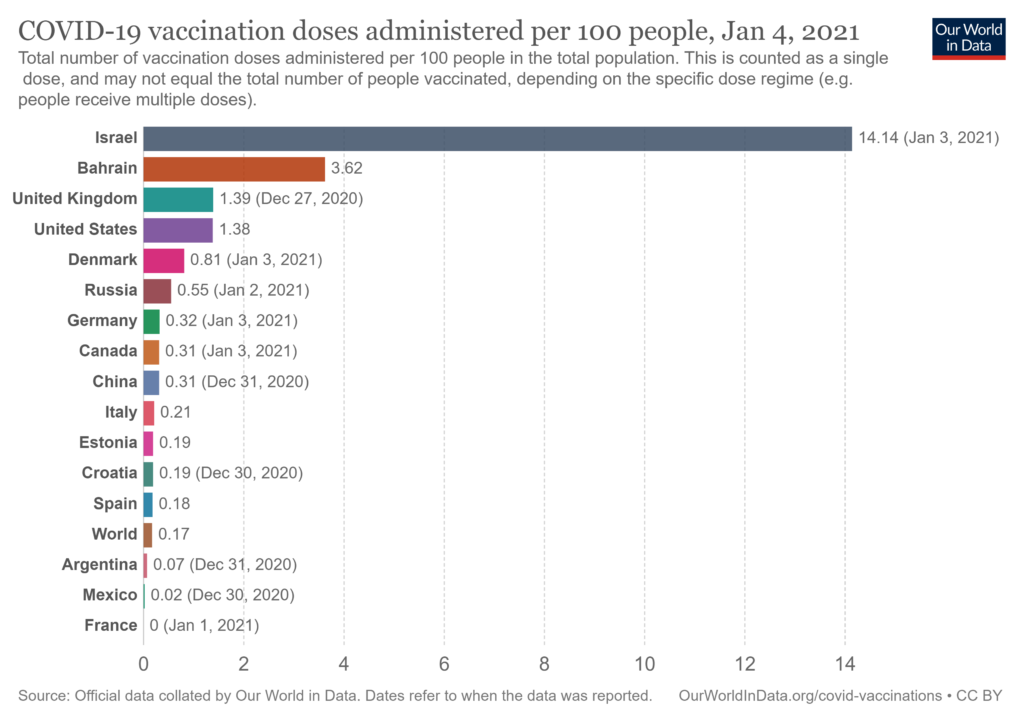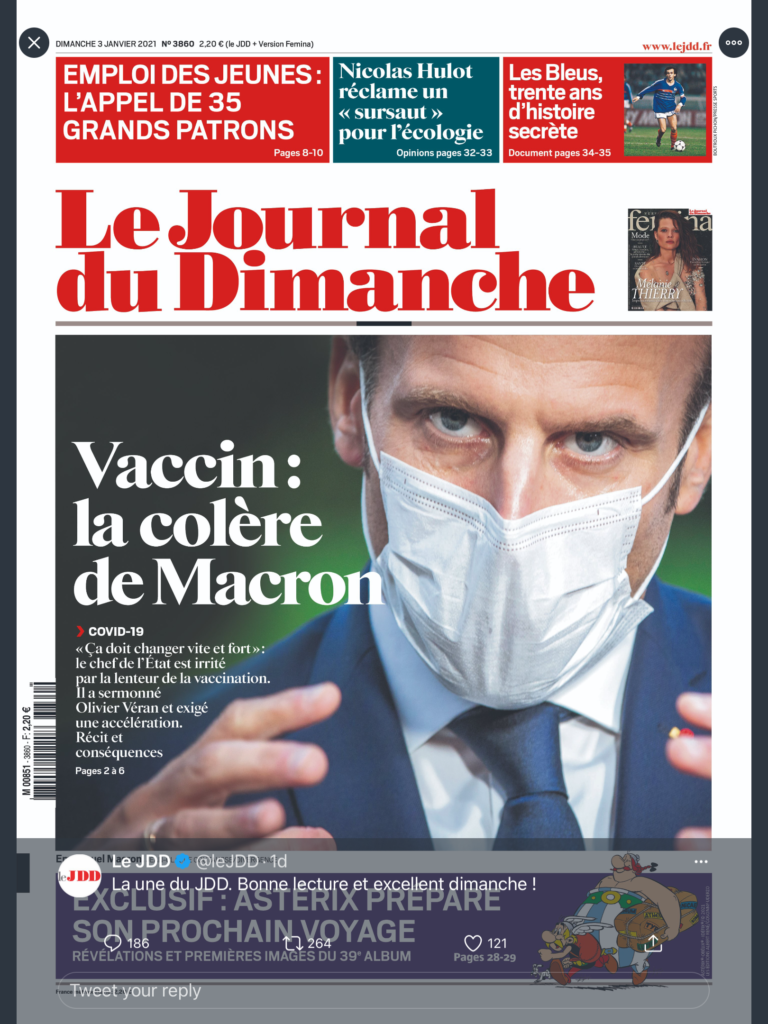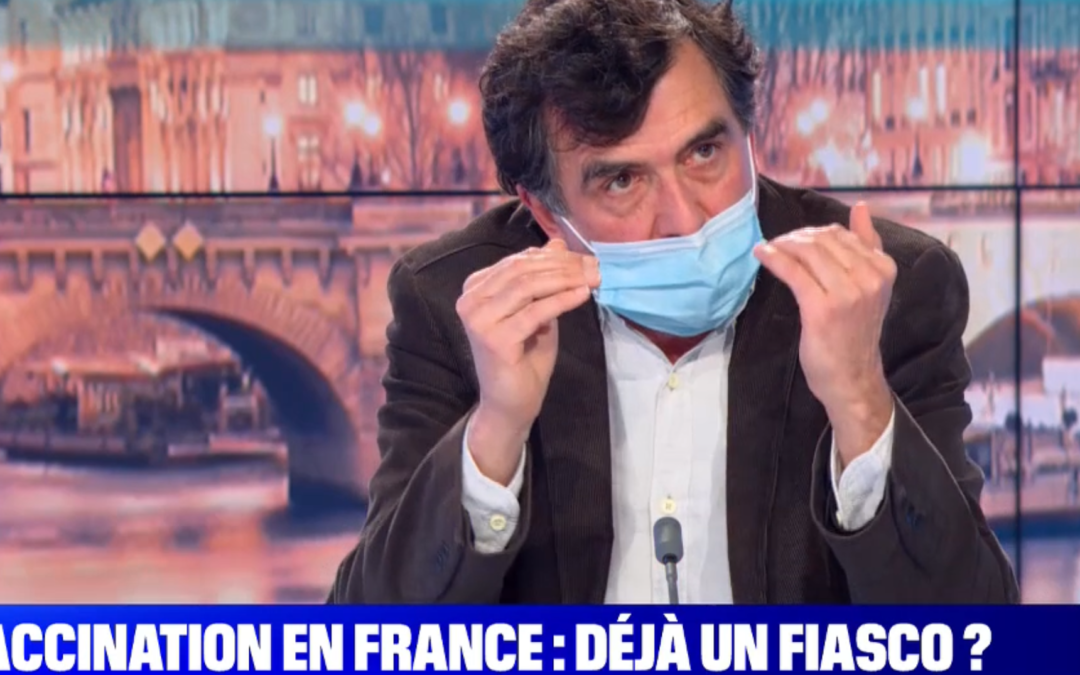For months, I bragged to my friends in the U.S. that France’s COVID vaccination program would be rapid, efficient and well-run, in keeping with its national health system.
Silly me.
The vaccination rollout here has been nothing short of a disaster. It’s replete with the elements of a classic French fiasco: incompetence, untruths, excessive bureaucracy, conspiracy theories and governmental arrogance. The result is one of the lowest levels of vaccination among countries that have begun inoculating.

The actual figure as of Jan. 4 is 516, as collated by Our World in Data. The comparable total for the U.K., even as it is roiled by Brexit and a new, more contagious strain of the virus, is nearing 1 million people. The Germans have vaccinated almost 300,000. Israel, where vaccinations are taking place 24/7, is the champion. It’s administered 1.2 million shots, covering more than 10% of the population. It’s on target for herd immunity by midsummer. In France, by contrast, it would take more than 5,000 years to get there at current rates.
This carping may sound excessive to those in the United States who at home are reading about expiring vaccine doses, or a lack of deliveries, or a rollout so slow that some states are considering administering half-doses. But this is about my adopted country’s national pride: its health system — No. 1 in the world, according to the World Population Review. The system that sends me regular reminders to get my free mammogram and my free colonoscopy. That gives me a health card accepted by any doctor’s office, hospital or pharmacy, and ditto my supplemental insurance.
Health Minister Olivier Véran said this morning on RTL Radio that the strategy is being completely overhauled, echoing other recent comments. Vaccinations will happen faster and to wider classes of people. Eventually, France will catch up, he says. But the damage has been done to what little trust and confidence the public has left.
How did this happen? The answers and theories fall into several categories.
- Anti-vaccination sentiment. France has long been Europe’s biggest vaccine hater, even though children are required to get certain immunizations before starting school. Perhaps it’s general distrust of authority (“We’re against everything,” said a French friend), or a history of health scandals, including contaminated blood, breast implants and previous vaccines. Dr. Arnaud Fontanet of the Institut Pasteur said on BFM-TV the other day that people still remember the costly and wasteful campaign of 2009 against H1N1 flu.
- Bureaucracy. To ease the vaccination concerns, the government originally required that patients consult with their regular doctor to get information about the vaccine and sign a written consent. Only then could they schedule a vaccination appointment. That strategy seems to be based on a fallacious premise: That very slow vaccinations of people who want them will ease the concerns of those who don’t.
- Lack of supply and distribution channels. France gets its pro-rata share of the EU allocation from Pfizer-BioNTech, but it’s unclear how much has actually arrived. The head of a major hospital system in eastern France told Le Monde that he had freezers and dry ice to store the vaccine, but no sign of any doses. And Liberation newspaper reported that the supplies for the city of Nice were delivered from Paris in a taxi.
- My favorite: Because the rollout began just after Christmas, many health workers and bureaucrats were on vacation (and in the case of health workers, deservedly so). But why not just say so rather than pretending the slow pace was part of a plan?
It gets worse: Politico reported today that the logistics strategy was designed at least in part by the McKinsey consulting company. I would have thought France had enough bureaucrats to handle that. The government is also recruiting 35 or so ordinary citizens, to be selected by lottery, to serve on an advisory council. They apparently will attempt to assuage public fears about being vaccinated.
Government justifications have totally failed to explain what’s going on. And its mishandling of previous phases of COVID-19 hasn’t helped. In the spring, officials said people didn’t need to wear masks, and only later was it discovered that they hadn’t ordered enough. Ditto with testing: The original line was that the triage system was so good that only minimal testing was needed. When in fact there weren’t enough tests.
In a country that rarely plays baseball, this episode counts as the third strike. “It makes me wonder what else they aren’t telling us,” said another French friend.
The Journal du Dimanche reported that President Emmanuel Macron was “furious” with the pace of vaccination, which he compared to a “family stroll.” Many found this odd, since he surely was apprised of the plans long ago, and he has described the fight against the virus by saying France is “at war.”

This debacle has served to unite groups that often disagree with each other: The French press, the American press, the political right, the political left. But it brings me no joy to report on it. I chose to live in France and become French because I believed in what this country stands for, including a health system that treats everyone fairly and well. I look forward to seeing that ideal return.
